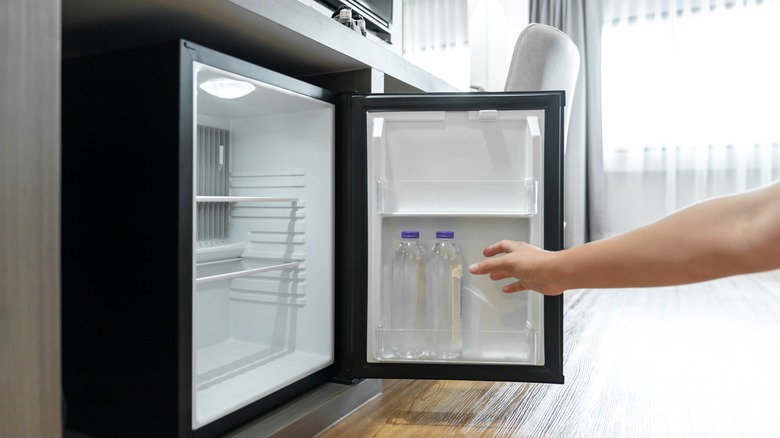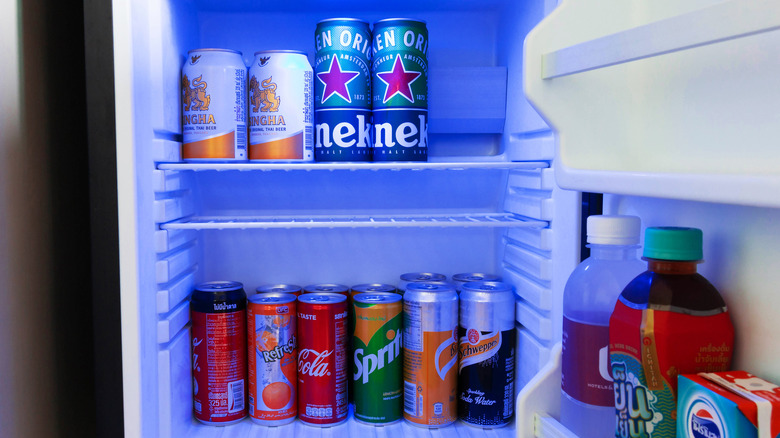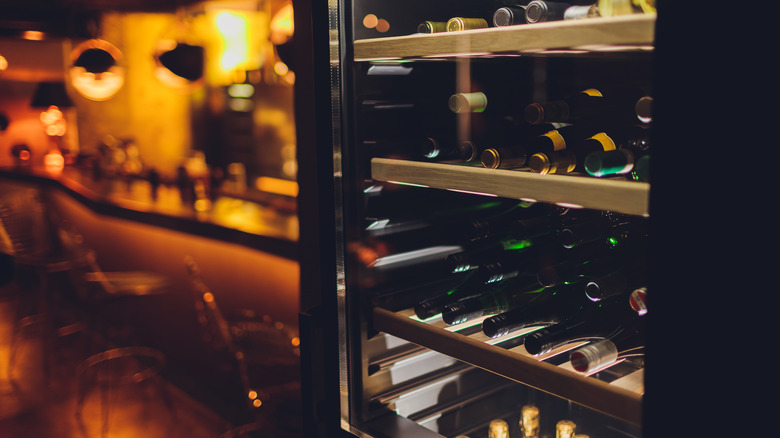Your Hotel's Mini Fridge Probably Isn't Safe For Takeout And Leftovers
A fridge is a fridge is a fridge, right? Well, not necessarily. Many hotel rooms are stocked with something you might assume is a mini fridge — where the beverages that make up the hotel minibar are usually stashed. But you may have noticed that these mini fridges never seem to be quite as cold as your fridge at home, and there's a reason for that.
Hotel rooms often have appliances called beverage coolers or drink fridges, which often resemble mini fridges, but don't serve exactly the same purpose. These beverage coolers are designed to keep wine and beer at a refreshing temperature, but they aren't built for long-term storage of groceries, takeout, or leftovers.
These drink fridges aren't built to get as cold as your average refrigerator since chilling alcoholic beverages is largely a matter of taste, not of safety. So while your rosé might keep crisp and cool, your linguine con vongole may come out a little lukewarm in the morning.
Drink fridge versus mini fridge
The FDA recommends a maximum fridge temperature of 40 degrees Fahrenheit for storing food, but most refrigerators will be set to 37 degrees Fahrenheit, which is considered the ideal temperature for food storage. Too far below this, and your items may freeze.
Drink fridges or beverage coolers, on the other hand, tend to keep above 40 degrees, usually between 41 and 65 degrees Fahrenheit. This means that they are outside the safe range for storing food (which is either under 40 degrees or above 140 degrees Fahrenheit). These types of coolers are generally more energy efficient than refrigerators, which is why hotels take advantage of them to cut energy-related costs, and sometimes even to be able to present themselves as being greener for promotional purposes. Similar techniques in hotels include implementing alerts when you have used a certain amount of water in the shower, or replacing towels and linens every few days instead of every day.
What if you have a beverage cooler?
If you're staying in a hotel, you probably weren't planning on doing a ton of cooking anyway. But if you do, staying at an Airbnb with a full kitchen might be a valuable alternative for avid cooks or travelers opting for a longer vacation stay.
But let's say a situation arises where you do need to keep your salmon shioyaki cool. First, check with the front desk to make sure your mini fridge is an actual fridge and not a beverage cooler. You can also see if you have the ability to adjust the temperature of your mini fridge yourself. If it is a beverage cooler and not a mini fridge, you may be able to ask the hotel to store certain items in a kitchen or break room fridge.
When all else fails, ask for a champagne bucket full of ice, and stick that in the fridge with your perishable items to keep them cool. Most of your food items will probably be fine for a limited amount of time anyway. Something like sushi should be finished ASAP, but half a leftover sandwich can handle eight hours in a beverage cooler without spoiling.



